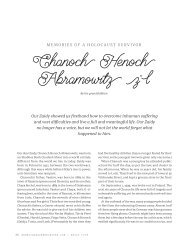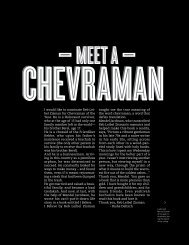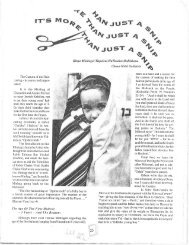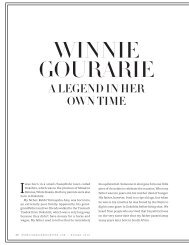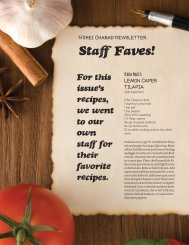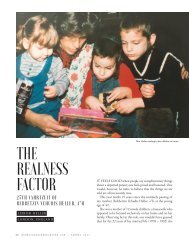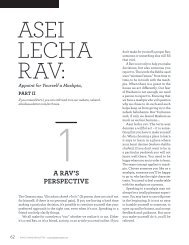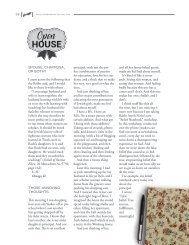Moshiach Kislev 77_1
Create successful ePaper yourself
Turn your PDF publications into a flip-book with our unique Google optimized e-Paper software.
THE<br />
MOSHIACH<br />
PAGE<br />
FROM CELL PHONES<br />
TO THE SOVIET UNION<br />
CHANIE WOLF<br />
The twelfth of the Rambam’s 13 Principles of Faith is: “I believe with perfect faith in<br />
the coming of the <strong>Moshiach</strong>. Even if he delays, I will wait every day for him to come.”<br />
The Rebbe teaches us that this does not mean that every day we should wait for <strong>Moshiach</strong>’s<br />
ultimate coming, but that every day we should wait expectantly for <strong>Moshiach</strong> to<br />
come on that very day.<br />
Close your eyes for a moment and think: “I believe and expect that <strong>Moshiach</strong> will<br />
come today.”<br />
What comes up? How does it feel?<br />
For many, a little gnawing voice of Amalek whispers, “But we’ve been waiting for<br />
thousands of years… and the Rebbe said 25 years ago that the time for Geulah has<br />
arrived… why today? How today?”<br />
Indeed, if we think of Geulah as a sudden, out-of-nowhere miraculous transformation,<br />
it may be difficult to anticipate it finally happening—now. Yet the Rebbe teaches<br />
us that the Geulah is in fact a gradual process. The revelation of Aleph—Hashem’s<br />
Oneness—in our world began with Avraham Avinu, continued with Mattan Torah,<br />
accelerated with the introduction of Chassidus… and is finally just about ready to overcome<br />
the deception of galus.<br />
We need only open our eyes, for the signs are everywhere that the world is at the<br />
December 2016<br />
17<br />
cusp of the miraculous era our ancestors<br />
dreamed about.<br />
Let’s start with your smartphone,<br />
assuming you’re one of the estimated 25%<br />
of the world’s population that owns one.<br />
Thirty years ago, almost no-one owned a<br />
cellphone. Many of our parents or grandparents<br />
grew up without telephones in<br />
their homes at all. Of course, it isn’t just<br />
phones. This drastic change in lifestyle is<br />
reflected in numerous other areas of life—<br />
home appliances and conveniences such<br />
as washers and dryers, refrigerators, and<br />
indoor plumbing; greatly expanded wardrobes;<br />
disposable everything. And food. So.<br />
Much. Food. My mother recalls receiving a<br />
treat in Communist Russia — one orange,<br />
to split amongst the entire family.<br />
In the words of the Rambam 1 :<br />
ובאותו הזמן לא יהיה שם לא רעב... הטובה תהא<br />
At“—מושפעת that הרבה וכל המעדנין מצויין כעפר<br />
time, there will be no hunger… good things<br />
will flow in abundance and all the delights<br />
will be as freely available as dust.”<br />
So you pick up this device and connect.<br />
With everyone. You call, text, send pictures<br />
and videos, and the world virtually<br />
shrinks. Years ago, I waited two weeks to<br />
receive a letter from my cousin who was<br />
in seminary across the globe. Today, I can<br />
see what my nieces and nephews in South<br />
Africa are doing—in real-time. Once-abstract<br />
spiritual concepts such as “an eye<br />
that sees and an ear that hears” are now<br />
becoming physical reality.<br />
This is a foretaste of what the navi 2 says,<br />
—ונגלה כבוד ה' וראו כל בשר יחדו כי פי ה' דבר<br />
“And the glory of Hashem will be revealed<br />
and all flesh will see that the mouth of G-d<br />
has spoken.” This passuk teaches us that<br />
when <strong>Moshiach</strong> comes, we will gain the<br />
ability to perceive Hashem’s glory with<br />
physical, sensory vision. Having the tangible<br />
metaphors of satellites and videos<br />
to understand Hashem’s omnipresence is<br />
a hint of this phenomenon.<br />
And you connect with Hashem too.<br />
With a few clicks and swipes, whether<br />
you are sitting on your couch or waiting<br />
in a doctor’s office, you can learn Chassidus,<br />
explained in language that is easy to<br />
1 Rambam, Mishne Torah, Hilchos Melachim 12:5<br />
2 Yeshayahu 40:5
18 nsheichabadnewsletter.com<br />
understand, easy to apply to daily life. You<br />
can watch videos of the Rebbe, study Chitas,<br />
or look up sources in online libraries<br />
of sefarim.<br />
Speaking of Torah, the explosion of<br />
Torah knowledge and scholarship in our<br />
generation has been magnificent. Translations,<br />
compilations and new editions<br />
of all types of sefarim are published constantly.<br />
Most of us have more sefarim in<br />
our homes than our great-grandparents<br />
ever saw. And it is not only a privileged<br />
few who have access to Torah learning, as<br />
it was for thousands of years; today, learning<br />
Torah is for everyone—men, women,<br />
and children.<br />
“The earth —כי מלאה הארץ דעה את ה'<br />
will be filled with knowledge of Hashem” 3<br />
The advancements in Torah learning<br />
and publishing have also contributed to<br />
an increased ability for all Yidden to keep<br />
halachah properly. Confused about tznius?<br />
Giving maaser? What you may request of<br />
a non-Jew on Shabbos? Where there was<br />
once obscurity or ignorance, today there<br />
is an abundance of halachic literature on<br />
just about any subject.<br />
This, together with recent technological<br />
advancements and material abundance,<br />
enables us to observe the mitzvos on an<br />
unprecedented level of accuracy and hiddur.<br />
From the availability of choice esrogim<br />
to the perfect manufacturing of tefillin and<br />
state-of-the-art, fully-equipped mikvaos,<br />
we can perform many mitzvos in an ideal<br />
manner for the first time in history.<br />
And where governments—notably the<br />
Soviet Union—once fought Yiddishkeit,<br />
now they openly encourage and enable<br />
its growth!<br />
והנה הגדר דביאת המשיח הוא שקיום המצוות<br />
“The definition of —יהי׳ אז בתכלית השלימות<br />
<strong>Moshiach</strong>’s coming is that the fulfillment<br />
of mitzvos will be at its utmost perfection” 4<br />
Now take a minute to check up some<br />
information about your trusty phone.<br />
Where was it made? Japan? China? Where<br />
were the apps you’re using invented?<br />
Today’s global economy reflects the<br />
modern understanding that cooperation<br />
3 Yeshayahu 11:9<br />
4 Rambam, Mishne Torah, Hilchos Melachim 11:1<br />
as explained in the Rebbe’s words<br />
This eleventh installment of The <strong>Moshiach</strong> Page is dedicated to<br />
our beloved Founder, Mrs. Brana Sheina Deitsch, a”h, shown here<br />
with her oldest child, Reb Yosef Deitsch of New Haven, CT.<br />
between nations benefits everyone, whereas the traditional policies of competition and<br />
aggression left everyone a loser. However imperfect its performance, the concept of a<br />
United Nations devoted to preventing unnecessary wars is revolutionary. From Kayin<br />
until World War II, the world spent thousands of years considering conflict and bloodshed<br />
acceptable. Suddenly, peace became the ideal. After the fall of Communism, the<br />
world powers began collaborating on arms reduction, redirecting funds to more peaceful<br />
and productive purposes.<br />
This trend continues today in all areas: Books with relationship advice fill the store<br />
shelves, companies are shifting to collaborative, team-working models, and lawsuits<br />
give way to mediation.<br />
be… “At that time there will —ובאותו הזמן לא יהי' שם... ולא מלחמה ולא קנאה ולא תחרות<br />
no war, no jealousy and no competition…” 5<br />
These are only a few of the many revolutionary advancements that we are experiencing<br />
today. After thousands of years of avodah, of Yidden elevating the world one<br />
mitzvah at a time, the world is beginning to look the way the Rambam, based on our<br />
neviim, describes Geulah. If we look with open eyes, we will see. We will feel. We will<br />
believe. And we will anticipate <strong>Moshiach</strong>’s coming—today!<br />
Chanie Wolf lives with her husband Yitzchok and their four<br />
young children in Crown Heights. A teacher and assistant<br />
principal at Bais Rivkah Seminary, she is passionate<br />
about Geulah, Chassidus and their relevance to the lives of<br />
Lubavitcher women and girls.




